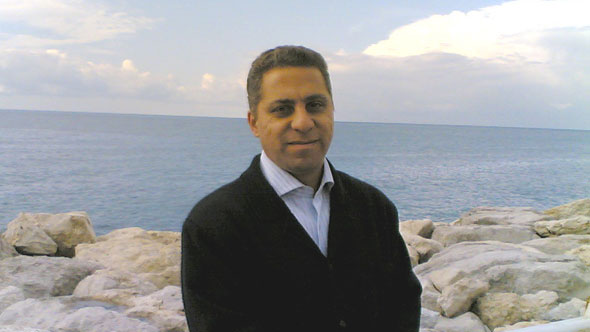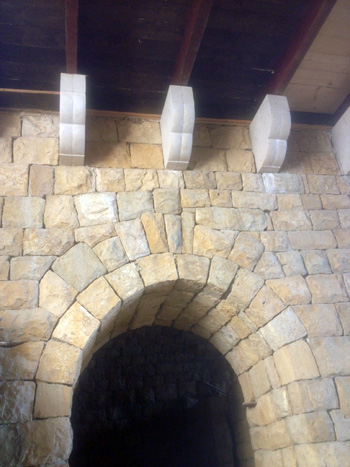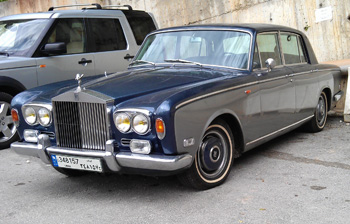FACES OF THE ECONOMY: Dr. Imad Khouri
Faces of Economy – Lebanon
FACES OF THE ECONOMY: Dr. Imad Khouri
There are 1.4 million workers in Lebanon – this is the story of one of them.
There is little rest for Dr. Imad Khouri – by choice he is a busy man.The doctor wakes up at 6 am to build his stone house; begins his daily work as a physician by 8 am, working up to 14 hours a day, and also twice a week holds a special clinic at an NGO, treating the victims of war.

FACES OF THE ECONOMY: Dr. Imad Khouri
There are 1.4 million workers in Lebanon – this is the story of one of them.
By Lena Al Rahbany
BEIRUT, Lebanon – There is little rest for Dr. Imad Khouri – by choice he is a busy man.
The doctor wakes up around 6 am daily to work by hand on building his stone house; begins his medical duties by 8 am; often clocking 14 hours a day (with hospital rounds, house calls, and seeing corporate clients at offices, among other calls) and twice a week holds a special clinic at a NGO center, treating the victims of war. He has even been known to meet commuter-patients at strategic spots along Beirut’s roadways for a quick check up.
What time might be left before sleep he particularly likes to delve into the world of high particle physics — as a hobby – reading late into the night.
“I chose medicine by serendipity, as I in some ways intended to study physics,” Khouri said with some levity. “I had a classmate in class in school, with whom I competed for high grades, who challenged me stating that he wants to study medicine, so I was provoked to become a doctor.”

Khouri added that in that in a twist of fate, while he is now effectively working as a general medicine physician in Beirut, his friend studied Electrical Engineering, was forced to leave Lebanon during the civil war to Europe, and is now working with the team of the Large Hadron Collider particle physics project in CERN (the European Organization for Nuclear Research)!
He added, musing about physics, “since childhood I was curious to delve into the secrets of the universe, I still read a lot on nuclear and particle physics, I like the nature of pure research that physics is all about…”
Like many in Lebanon, Khouri’s path in life was further influenced by the years of the civil war. He had registered to study biology at the Lebanese University in Hadeth in 1982, which closed its doors after six months due to war incidents.
In 1983, thanks to his father’s friendships and acquaintances in the then-Eastern Bloc, he travelled to continue his “circumstances-interrupted” studies in Ukraine in Pirogov Memorial Medical University, a well -known institution named after Nocolay Pirogov, a Russian scientist renowned internationally as the founder of field surgery, where Imad met his wife to be, Natasha.
He moved later to Moscow to carry on his specialisation in Haematology and Oncology at the Russian Academy of Medical Sciences where he stayed for two years; meanwhile, he applied for the colloquium test in Lebanon, passed it successfully, and decided to stay in his mother country to start practicing general medicine in 1995. His formal practice is general family medicine, treating patients from age 10 to the elderly.
Talking about his university years, he replied: “I graduated with honours, which made my Lebanese classmates give me the nickname “Professor” because I used to help them in their homework and research.”
Khouri noted for Marcopolis that the greatest challenge in practicing medicine in Lebanon is the difficulty of dealing with the medical system, specifically the insurance plans, such as the NSSF and the private insurers.
He added that a doctor’s aptitude and income depends on what fraction of society he treats, whether he is practicing in the major cities or in the rural areas.
Regarding the most prevalent illness, the doctor noted that during his 18 years of practical clinical experience and observations, the most common illness in Lebanon is food contamination and poisoning, followed by musculoskeletal illnesses, then heart problems.
Regarding the most prevalent illness, the doctor noted that during his 18 years of practical clinical experience and observations, the most common illness in Lebanon is food contamination and poisoning, followed by musculoskeletal illnesses, then heart problems.
About the ups and downs of this profession, he said that being a doctor takes a lot of time away from a person’s private life, his family and social relations. More often than not, the doctor will be visiting a friend and needs to excuse himself a number of times by patients calling for emergencies and/or other requests.
While he said there are more than enough accolades from grateful patients, it is also often the case that patients take for granted the time and expertise a doctor is putting into an individual case – whether a simple house call, or coming to the emergency room to consult.
Khouri said the even if it is just an internal feeling of success — to be able to bring someone back from the brink of death; to help a sick child, or make the elderly feel better — he walks away from these cases with a feeling of joy. Also, when he is able to apply a new technique to help a patient there is a good feeling of having solved a difficult case. He alluded for instance to the case of a young man dying from Hepatitis whom he was able to save with a novel technique.
Along with the demands of his general medicine practice Imad Khouri nevertheless finds time to work three hours weekly at Nassim, an NGO clinic established by the Lebanese Association of Human Rights and funded by the Dutch government to help with regional victims of torture. This includes Lebanese who have been tortured abroad in various regional turmoil and an increasing number of Syrians. He attends to the medical problems of these victims while a psychotherapist attends to the psychological problems.

Nassim, according to Dr. Khouri, has treated hundreds of ex-prisoners since 2008, and it includes the services of a doctor, a lawyer, a psychotherapist, a physiotherapist. He personally treats on average 15 patients per month.
As for his hobbies, beside manual construction of cars and stone houses, Khouri’s eyes shine when he talks about his fondness for reading since early childhood, triggered by the conversations and discussions he used to hear at home about religion that made him curious to know more about the universe.
He has eclectic reading interests, covering mathematics, quantum and particle physics, philosophy of religions, in addition to practical technical books that teach manual skills, like welding or carpentry.
The latter books were to come in very handy. Khouri took the bold decision to build his dream house in 2005 — mostly by hand – in the Nabey village. Building along traditional Levantine lines; delving into stone masonry techniques and purchasing stone cutting gear.
The doctor is also fond of cars, collection cars … speedy cars. He even noted his skills in driving large specialized heavy duty trucks, like excavators, crawlers, bobcats and drillers.
This fondness for things automotive led him to assembling a 1973 model Rolls Royce Silver Shadow within six months, with the help of a fellow mechanic, where he cut and assembled bits and pieces from several cars and parts into his dream car, fully operational.
He has eclectic reading interests, covering mathematics, quantum and particle physics, philosophy of religions, in addition to practical technical books that teach manual skills, like welding or carpentry.
He is also a strong supporter of animal rights in Lebanon; “I even stop my car in the middle of the street to save a chameleon wandering carelessly on the road, by relocating it to a safe place, in front of astonished passers-by; one of whom as entranced that she stopped her car and offered to help me.”
He added “we should take care of the lovely Lebanese ecosystem and natural fauna and flora wealth, and do our best to regulate the hunting sector, because local hunters are totally irresponsible and never hesitate in harming nature and animals.”
A conversation with the doctor is like entering an eclectic graduate-school seminar. During one chat, he delved into explaining about Pythagoras’s Trinity concept, on which Christianity was based.
He also states that he is “proud of his Phoenician origins,” and even expresses an almost fanatic zeal to their “huge mark on ancient history,” as they were “the main source of Ancient Greek and Egyptian civilizations.”
And for doubters in his bold assertion, he advises them to read historian Sanford Holst, particularly “Phoenician Secrets.”
EDITOR’S NOTE: Marcopolis will frequently profile a different hardworking citizen. Nominations can be sent by you, friends, family or even coworkers, for inclusion in the “Face” series. Tell us your story. Send it to contributing business correspondent: T.K, Maloy: tkmaloy@gmail.com